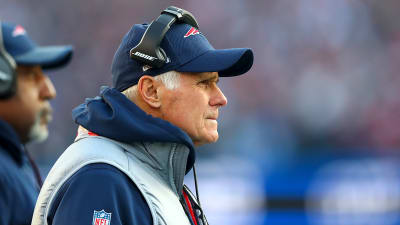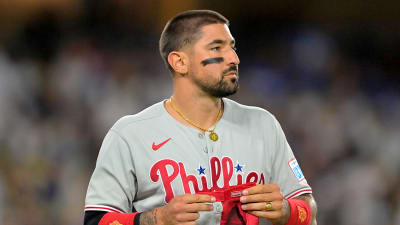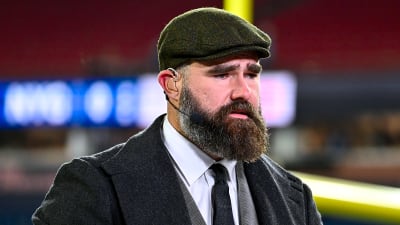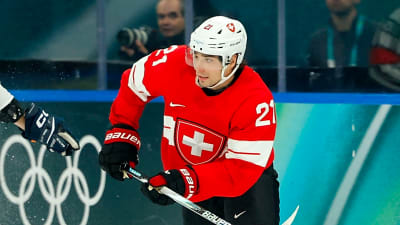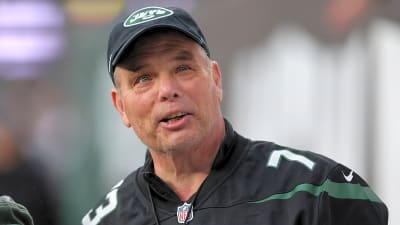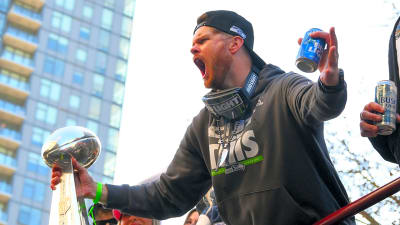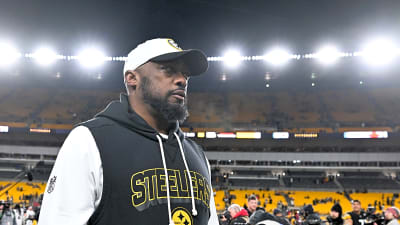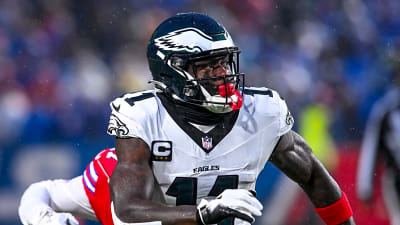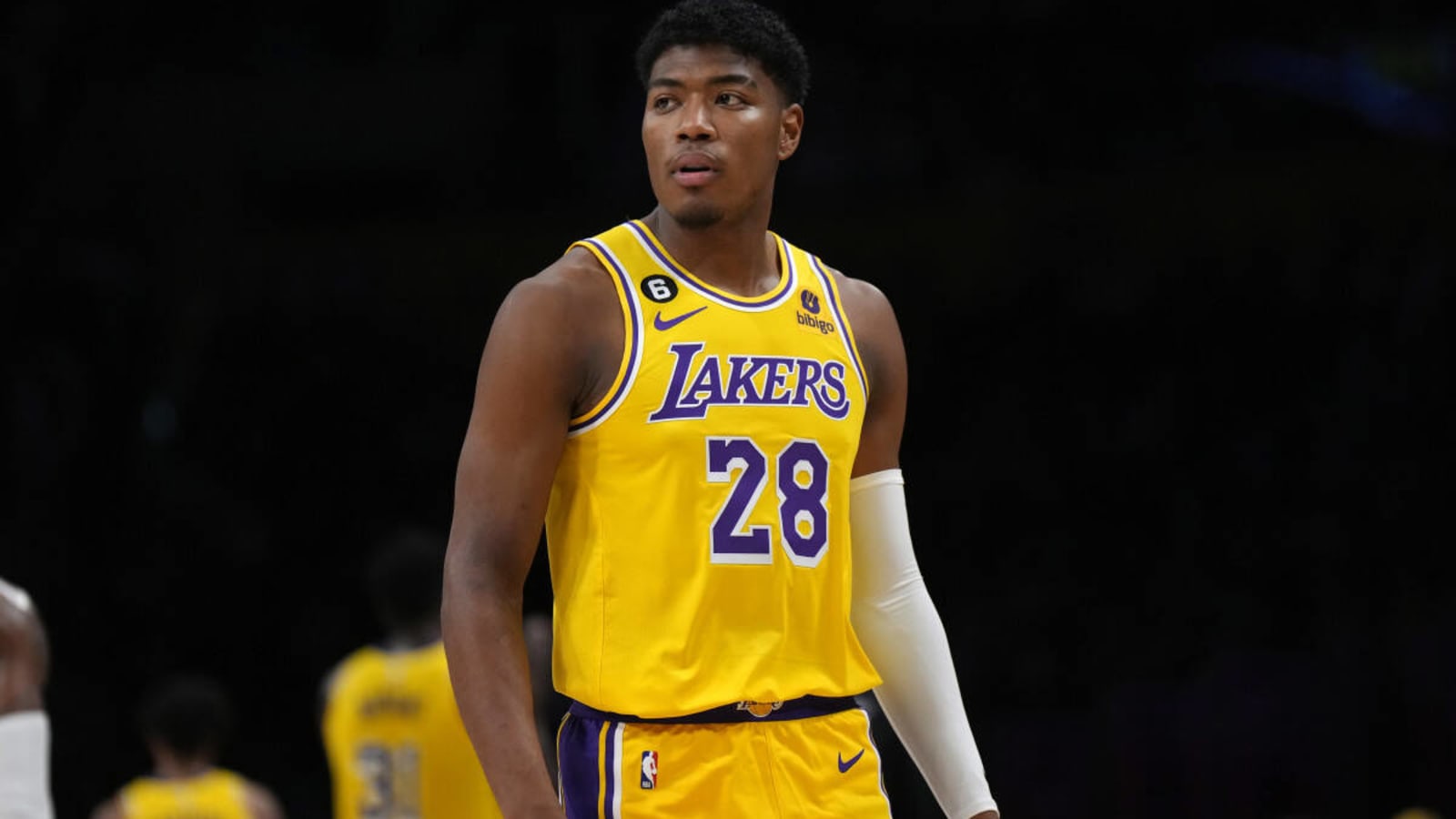
The Los Angeles Lakers have been through countless starting lineup changes dating back to 1980 when the “Showtime” Lakers were slowly becoming a dominant force in the NBA. Since then, the Lakers' starting power forward position has been a focal point of pure defense, aggression, and consistency.
After seeing how the small forward position went through so many changes between 1980 and 2023, it is time to focus on the power forwards who held it down for the iconic Purple and Gold franchise.
1980: Spencer Haywood
Career Stats With The Lakers: 9.7 PPG, 4.6 RPG, 1.2 APG, 0.5 SPG, 0.8 BPG
Career Achievements With The Lakers: 1979-80 NBA Champion
Spencer Haywood's stint as the Lakers' starting power forward in the 1980 season was a pivotal chapter in the team's history. Joining the Lakers in the twilight of his career, Haywood's impact was immediate, as he played a crucial role in the team's championship run. Despite being past his prime, Haywood's veteran presence and knack for timely plays made him a valuable asset on the court.
Although his individual stats might not jump off the page, averaging 9.7 points, 4.6 rebounds, 1.2 assists, 0.5 steals, and 0.8 blocks per game, his contributions extended beyond the box score. His championship pedigree and experience added a layer of depth to the Lakers' roster, and his one-year stint with the Lakers ultimately proved pivotal.
1981: Jim Chones

Career Stats With The Lakers: 10.7 PPG, 7.4 RPG, 1.9 APG, 0.6 SPG, 1.0 BPG
Career Achievements With The Lakers: 1979-80 NBA Champion
In the 1981 season, Jim Chones took the reins as the Lakers' starting power forward, following in the footsteps of Spencer Haywood. Chones brought a different style to the position, known for his rugged play and tenacity on the court. Despite not capturing another championship in his time with the Lakers, Chones was still a solid servant for the franchise over 1980 (as a backup) and 1981.
Beyond the numbers, Chones' physicality and defensive prowess were invaluable assets for the team, providing a formidable presence in the paint. While his tenure with the Lakers might not be as illustrious as some of the franchise's other power forwards, Chones' contributions underscore the depth of talent that has graced the Lakers' roster over the years.
1982: Mark Landsberger

Career Stats With The Lakers: 4.7 PPG, 5.2 RPG, 0.4 APG, 0.2 SPG, 0.1 BPG
Career Achievements With The Lakers: 2x NBA Champion
In 1982, Mark Landsberger stepped into the role of the Lakers' starting power forward, adding his own unique flavor to the team's dynamic. Known for his hustle and tenacity on the court, Landsberger's contributions often went beyond the stat sheet. While his career stats with the Lakers may not jump off the page, averaging 4.7 points and 5.2 rebounds per game, his impact was felt in other ways.
Landsberger's relentless energy and willingness to do the dirty work made him a valuable asset to the Lakers' championship aspirations. His knack for grabbing crucial rebounds and setting hard screens exemplified his blue-collar approach to the game. Landsberger's two NBA championships with the Lakers further solidify his place in franchise history, underscoring his role in the team's success during the early '80s between 1980 and 1983.
1983: Kurt Rambis
Career Stats With The Lakers: 5.4 PPG, 5.3 RPG, 0.8 APG, 0.6 SPG, 0.5 BPG
Career Achievements With The Lakers: 4x NBA Champion
In 1983, the Lakers' starting power forward position was anchored by none other than Kurt Rambis, a fan favorite known for his hustle and gritty style of play. Despite not boasting flashy numbers, Rambis made his presence felt on both ends of the court, epitomizing the blue-collar work ethic that endeared him to Lakers faithful.
Despite being a backup for most of his career in Los Angeles, Rambis took the starting role in 1983 and his relentless energy, willingness to sacrifice his body for loose balls, and defensive tenacity made him a vital cog in the Lakers' championship machine. Beyond the accolades, Rambis' iconic thick-rimmed glasses and trademark mustache have etched him into Lakers lore forever.
1984: James Worthy
Career Stats With The Lakers: 17.6 PPG, 5.1 RPG, 3.0 APG, 1.1 SPG, 0.7 BPG
Career Achievements With The Lakers: 3x NBA Champion, 1987-88 Finals MVP, 7x All-Star, 2x All-NBA Team Selection
In 1984, the Lakers' starting power forward spot was graced by the legendary James Worthy, affectionately known as "Big Game James." Worthy's arrival in 19832 marked a significant shift in the team's dynamic, as he brought an unparalleled combination of athleticism, skill, and championship pedigree to the court. After being a backup in the 1983 season, Worthy started as a power forward in the 1984 season.
His impact on the court was undeniable, as he showcased his scoring prowess, averaging 14.5 points per game, while also contributing 6.3 rebounds per game. Worthy's stellar performance in the 1984 season laid the groundwork for his future accolades, including three NBA championships, the 1987-88 Finals MVP award, and multiple All-Star and All-NBA Team selections.
1985-1986: Kurt Rambis
Career Stats With The Lakers: 5.4 PPG, 5.3 RPG, 0.8 APG, 0.6 SPG, 0.5 BPG
Career Achievements With The Lakers: 4x NBA Champion
Kurt Rambis returned to his role as the starting power forward in 1985 and 1986, winning the championship in the latter season. The big man continued his dirty work style of play and used his 6’8” height to battle inside the paint, posting 6.1 points, 6.8 rebounds, and 0.5 blocks per game.
He followed it up with averages of 4.8 points, 5.9 rebounds, and 0.5 blocks per game in 1986. The big man was often available to play, playing 82 games in ‘85 and 74 in ‘86. It might be easier to forget Rambis as a key Lakers contributor behind the likes of James Worthy and AC Green (as we will see), he was a pivotal role player for the Purple and Gold.
1987-1990: AC Green
Career Stats With The Lakers: 10.6 PPG, 7.7 RPG, 1.1 APG, 0.9 SPG, 0.5 BPG
Career Achievements With The Lakers: 3x NBA Champion, 1989-90 All-Star, 1988-89 All-Defensive Team Selection
From 1987 to 1990, the Lakers' starting power forward position was securely held by the reliable and tenacious AC Green who was taken No. 23 overall in the 1985 Draft. Green's tenure with the Lakers during this period was marked by his unwavering consistency and invaluable contributions to the team's success.
Green's role as a key cog in the Lakers' championship aspirations was further solidified by his three NBA titles with the team, two of which came in 1987 and 1988. Additionally, his stellar play earned him individual recognition, including an All-Star nod in the 1989-90 season and a selection to the All-Defensive Team in 1988-89.
1991: Sam Perkins
Career Stats With The Lakers: 14.6 PPG, 8.0 RPG, 2.0 APG, 0.9 SPG, 1.0 BPG
Career Achievements With The Lakers: N/A
In 1991, the Lakers turned to the versatile Sam Perkins to fill the starting power forward position, adding a new dimension to their lineup. Perkins brought a unique blend of size, shooting, and basketball IQ to the team, making him a valuable asset on both ends of the court.
With his ability to stretch the floor with his outside shooting and contribute in the post, Perkins added a new dynamic to the Lakers offense. Despite his short tenure with the Lakers, lasting a little over two seasons, Perkins averaged 13.5 points per game in the 1991 season and was one of their better players in terms of consistency.
1992-1993: AC Green
Career Stats With The Lakers: 10.6 PPG, 7.7 RPG, 1.1 APG, 0.9 SPG, 0.5 BPG
Career Achievements With The Lakers: 3x NBA Champion, 1989-90 All-Star, 1988-89 All-Defensive Team Selection
In the 1992 and 1993 seasons, AC Green resumed his role as the Lakers' starting power forward, reaffirming his status as a linchpin in the team's lineup. Green's return to the starting lineup during this period was a testament to his enduring consistency and value to the team. With his blue-collar work ethic and relentless rebounding, Green provided stability and energy to the Lakers' frontcourt.
Despite facing new challenges and changes within the roster, Green's unwavering commitment to his craft remained unwavering. His averages of 14.6 points and 7.6 rebounds per game during these seasons underscored his continued impact on the court.
1994-1997: Elden Campbell
Career Stats With The Lakers: 10.4 PPG, 5.8 RPG, 1.1 APG, 0.7 SPG, 1.7 BPG
Career Achievements With The Lakers: N/A
From 1994 to 1997, Elden Campbell held down the starting power forward position for the Lakers, bringing his unique blend of athleticism and defensive prowess to the forefront. Campbell's presence in the starting lineup provided the Lakers with a formidable interior presence on both ends of the court.
Offensively, Campbell's versatility allowed him to score in a variety of ways, whether it be through post-ups, mid-range jumpers, or finishing around the rim. Despite not having specific career achievements with the Lakers, Campbell's contributions during this period were instrumental in maintaining the team's competitiveness in the Western Conference.
1998-2000: Robert Horry
Career Stats With The Lakers: 6.3 PPG, 5.5 RPG, 2.2 APG, 1.1 SPG, 1.0 BPG
Career Achievements With The Lakers: 3x NBA Champion
From 1998 to 2000, the Lakers' starting power forward position was held by the clutch and versatile Robert Horry, whose nickname "Big Shot Rob" became synonymous with timely baskets in crucial moments. Horry's tenure with the Lakers during this period coincided with the team's resurgence as championship contenders. With his unique skill set, Horry provided the Lakers with a valuable stretch-four presence, capable of knocking down three-pointers and defending multiple positions.
While his individual statistics may not always tell the full story, his impact on the court was undeniable. Horry's knack for stepping up in pressure situations earned him a reputation as one of the most clutch players in NBA history. His timely three-pointers and defensive stops were instrumental in the Lakers' playoff success during this era. Horry won his first title with the Lakers in the 2000 season.
2001: Horace Grant
Career Stats With The Lakers: 6.7 PPG, 5.9 RPG, 1.5 APG, 0.6 SPG, 0.6 BPG
Career Achievements With The Lakers: 2000-01 NBA Champion
In the 2001 season, the Lakers turned to the seasoned veteran Horace Grant to man the starting power forward position, adding a wealth of experience and defensive prowess to their lineup. Grant's arrival injected a sense of stability and defensive intensity into the Lakers' frontcourt, complementing the team's star-studded roster.
Known for his tenacious rebounding and shot-blocking ability, Grant provided invaluable support on the defensive end from his days with the Chicago Bulls and Orlando Magic and opted to do the same to anchor the Lakers' interior defense. Additionally, his basketball IQ and knack for making the right plays at the right time made him a valuable asset on both ends of the court. Grant would win his fourth title overall and his only with the Lakers during the 2001 season.
2002-2003: Robert Horry
Career Stats With The Lakers: 6.3 PPG, 5.5 RPG, 2.2 APG, 1.1 SPG, 1.0 BPG
Career Achievements With The Lakers: 3x NBA Champion
Continuing his impactful tenure, Robert Horry reprised his role as the Lakers' starting power forward for the 2002 and 2003 seasons. Horry's return to the starting lineup during this period brought a sense of stability and championship experience to the Lakers' frontcourt. With his uncanny ability to deliver in clutch moments, Horry played an instrumental role in the Lakers' playoff runs during these seasons.
His knack for hitting crucial three-pointers and making game-changing defensive plays became a defining characteristic of his tenure with the team. Despite facing stiff competition in the Western Conference, Horry's veteran leadership and playoff pedigree helped guide the Lakers to deep postseason runs. He won his third NBA title with the Lakers in the 2003 season and his legacy as a clutch player was set.
2004: Karl Malone
Career Stats With The Lakers: 13.2 PPG, 8.7 RPG, 3.9 APG, 1.2 SPG, 0.5 BPG
Career Achievements With The Lakers: N/A
In the 2004 season, the Lakers made a splash by acquiring the legendary Karl Malone to fill the starting power forward role, adding a future Hall of Famer to their already star-studded lineup featuring Shaquille O’Neal and Kobe Bryant. Malone's arrival brought a wealth of experience, leadership, and offensive firepower to the Lakers' frontcourt.
With his unparalleled scoring ability in the post, mid-range game, and exceptional rebounding skills, Malone provided a dominant presence on both ends of the court. While injuries limited Malone's availability throughout the season, his impact on the Lakers' lineup was unmistakable as he averaged 13.2 points per game in the regular season but could not prevent a shocking 2004 Finals loss.
2005-2008: Lamar Odom

Career Stats With The Lakers: 13.7 PPG, 9.5 RPG, 3.7 APG, 0.9 SPG, 0.9 BPG
Career Achievements With The Lakers: 2x NBA champion, 2010-11 Sixth Man Of The Year
From 2005 to 2008, the Lakers entrusted Lamar Odom with the starting power forward role, a decision that proved to be a masterstroke as Odom blossomed into a versatile and invaluable asset for the team. His ability to contribute across multiple facets of the game made him a Swiss Army knife on the court, capable of impacting the game in various ways.
Odom's exceptional ball-handling, passing, and court vision for a player of his size were rare commodities, allowing him to initiate the offense, facilitate ball movement, and create scoring opportunities for his teammates. With the Lakers still trying to rebuild around Kobe Bryant, Odom’s presence as arguably the second-best player on the team before Pau Gasol came around in 2008 was huge.
2009-2013: Pau Gasol

Career Stats With The Lakers: 17.7 PPG, 9.9 RPG, 3.5 APG, 0.6 SPG, 1.4 BPG
Career Achievements With The Lakers: 2x NBA Champion, 3x All-Star, 3x All-NBA Team Selection
With Andrew Bynum holding down the starting center spot until the 2012 season and Dwight Howard occupying it in 2013, Pau Gasol became the power forward, and what a run he had. From 2009 to 2013, the Lakers were anchored by the skilled and versatile Pau Gasol at the starting power forward position, marking a period of sustained success and championship contention for the team.
His basketball IQ and court vision enabled him to excel in the high-low game alongside fellow All-Star center Andrew Bynum, creating matchup nightmares for opposing defenses. Gasol played an instrumental role in the team's championship runs, helping them capture back-to-back NBA titles in 2009 and 2010. After 2010, the Lakers had to undergo a transformation that would last a very long time.
2014: Jordan Hill

Career Stats With The Lakers: 9.9 PPG, 7.2 RPG, 1.0 APG, 0.4 SPG, 0.8 BPG
Career Achievements With The Lakers: N/A
With Kobe Bryant out for the entire season, barring six games played, the Lakers turned to Jordan Hill to fill the starting power forward position, looking to inject energy and athleticism into their lineup. Hill's tenure with the Lakers showcased his ability to be a productive player on both ends of the court, with averages of 9.9 points, 7.2 rebounds, 1.0 assists, 0.4 steals, and 0.8 blocks per game.
His relentless work on the boards and willingness to do the dirty work in the paint made him a valuable asset to the team. He probably should not have been injected into the starting lineup as much as he did, but the Lakers had to write off the 2014 season regardless.
2015: Ed Davis

Career Stats With The Lakers: 8.3 PPG, 7.6 RPG, 1.2 APG, 0.6 SPG, 1.2 BPG
Career Achievements With The Lakers: N/A
In 2015, the Lakers looked to Ed Davis to take on the starting power forward role, hoping to capitalize on his athleticism and rebounding prowess. Davis brought a high motor and tenacity to the court, consistently making an impact on both ends of the floor. At the very least, Davis' mobility and ability to finish around the rim made him a threat in the pick-and-roll game.
Despite the challenges and transitions the team faced during the 2015 season, Davis' consistent effort and energy served as a bright spot for Lakers fans but once again, the year was a write-off because Kobe Bryant could only play 35 games and the team had a putrid 21-61 record.
2016-2017: Julius Randle

Career Stats With The Lakers: 13.5 PPG, 8.9 RPG, 2.6 APG, 0.6 SPG, 0.5 BPG
Career Achievements With The Lakers: N/A
In 2016 and 2017, Julius Randle became a full-time starting power forward after missing the entire season the year prior despite being taken No. 7 overall in the 2014 Draft. Randle's explosive athleticism, strength, and versatility made him a dynamic force on the court. With career averages of 13.5 points, 8.9 rebounds, and 2.6 assists per game during his time with the Lakers, Randle showcased his ability to impact the game in multiple ways.
His ability to handle the ball, attack the basket, and create scoring opportunities for himself and his teammates made him a focal point of the Lakers' offense. Despite facing team challenges and transitions within the organization during the 2016 and 2017 seasons, Randle's energy and passion for the game served as a source of inspiration for Lakers fans and he was probably the only bright spot on the team.
2018-2019: Kyle Kuzma

Career Stats With The Lakers: 15.2 PPG, 5.6 RPG, 1.9 APG, 0.6 SPG, 0.5 BPG
Career Achievements With The Lakers: 2019-20 NBA Champion, 2017-18 All-Rookie Team Selection
Kyle Kuzma proved to be another bright spot, getting taken No. 27 overall in the 2017 Draft and answering the call in his rookie campaign. He averaged 16.1 points per game, finished fourth in the Rookie of the Year race, and made the All-Rookie Team. The Lakers still weren’t winning games, going 35-47, but Kuzma was impressive.
In 2019, the forward added 18.7 points and 5.5 rebounds per game as he looked to be close to untouchable going forward. That sentiment would obviously change, but Kuzma’s great start to his career with the Lakers proved pivotal as the next season would see him take up a bench role and play his important role.
2020-2022: Anthony Davis

Career Stats With The Lakers: 24.7 PPG, 10.6 RPG, 3.1 APG, 1.2 SPG, 2.2 BPG
Career Achievements With The Lakers: 2019-20 NBA Champion, 3x All-Star, All-NBA Team Selection, All-NBA Defensive Team Selection
In the 2020 and 2021 seasons, the Lakers were bolstered by the presence of Anthony Davis as their starting power forward, marking a significant addition to their championship-caliber roster. Davis's arrival in Los Angeles brought with it a combination of elite skills, athleticism, and defensive prowess that elevated the Lakers to title contention. The duo of LeBron James and Anthony Davis was literally horrifying to come up against in terms of size and skill.
The big man chipped in 26.1 points and 9.3 rebounds per game in the 2020 championship season, leading the team in scoring and then adding 27.7 points and 9.7 rebounds per game in the playoffs. Davis was a fantastic addition to the Lakers even if the 2021 and 2022 campaigns were filled with drama and poor play by the team.
2023: Rui Hachimura

Career Stats With The Lakers: 11.4 PPG, 4.1 RPG, 0.9 APG, 0.5 SPG, 0.4 BPG
Career Achievements With The Lakers: N/A
Rui Hachimura was an excellent addition by the Lakers before the trade deadline in 2023, and even if he joined mid-season, he brought some stability to the power forward spot due to his size and athleticism. The Lakers shuffled their starting lineup throughout the 2023 campaign, but Hachimura played a role in a surprising Western Conference Finals run.
He posted 9.6 points per game with the Lakers in the regular season but added 12.2 points per game in the playoffs. His presence as a mid-range scorer and all-around threat had a positive impact on the Lakers and that is why he is still on the team. Even if Hachimura likely won’t win a title alongside LeBron James who is now 39 years old, he at least built a reputation with the Purple and Gold.
More must-reads:
- Lakers confident in pursuit of 'big prize' Giannis Antetokounmpo
- Mark Cuban weighs in on tanking: "The NBA should worry more about fan experience"
- The 'Multiple 20-assist NBA games' quiz
Breaking News
Trending News
Customize Your Newsletter
 +
+
Get the latest news and rumors, customized to your favorite sports and teams. Emailed daily. Always free!
